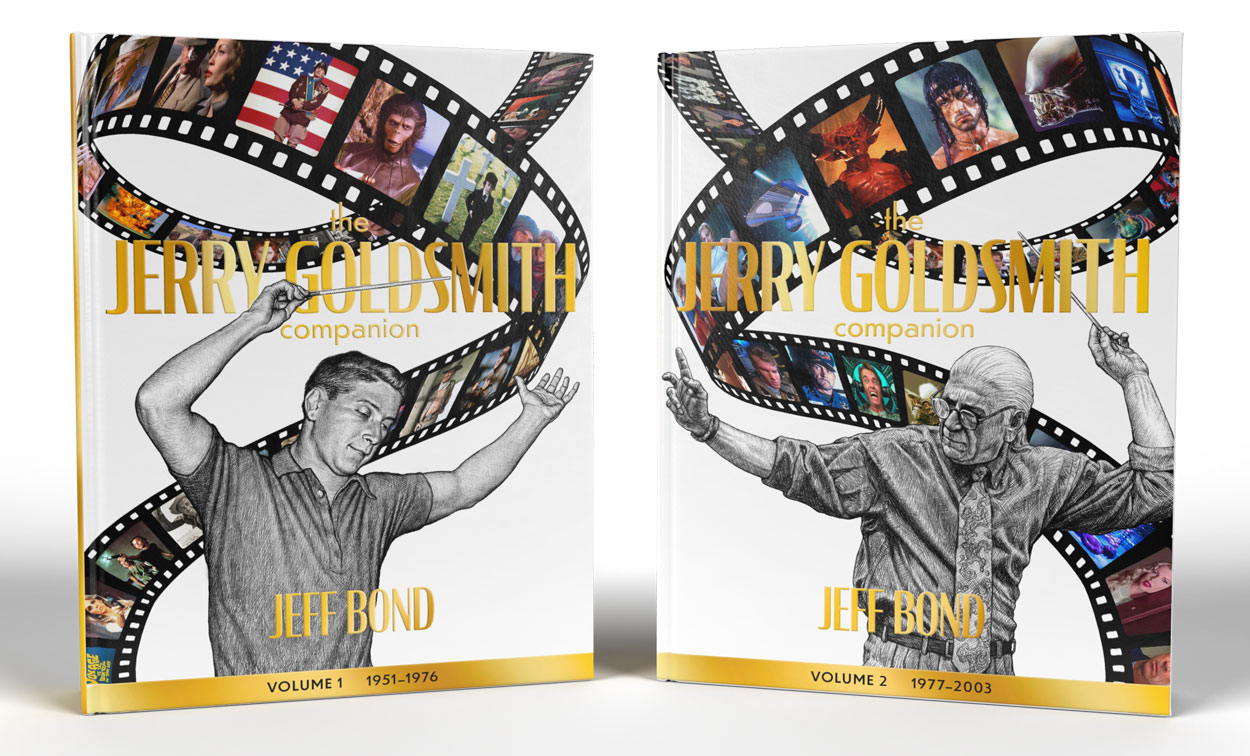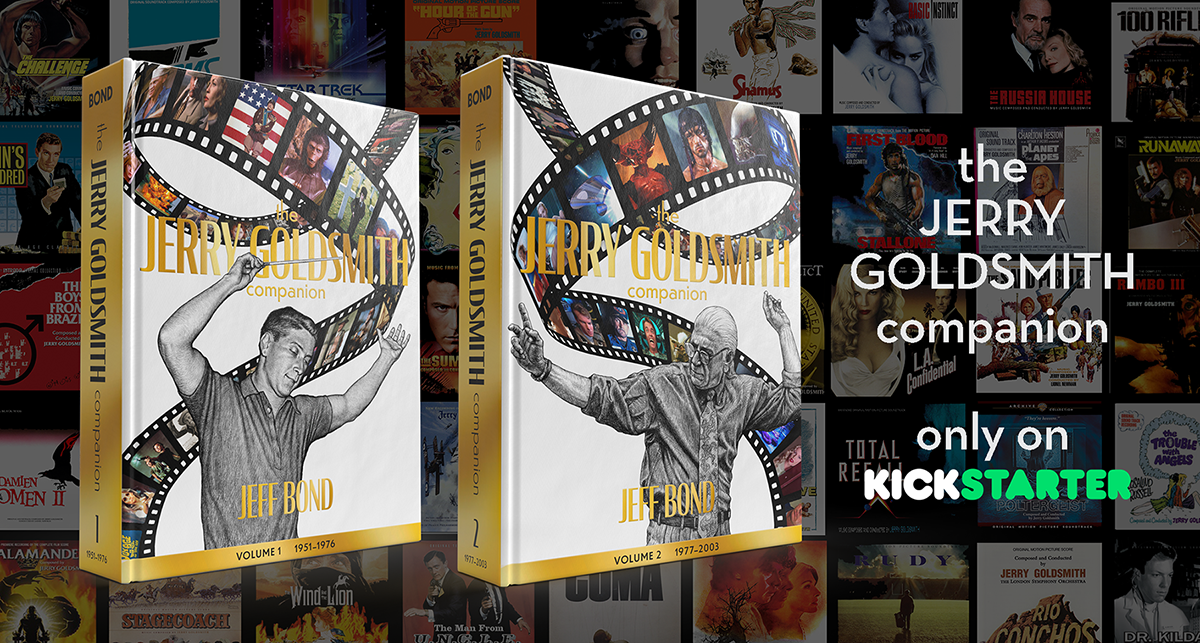Creature Features Publishing is now fundraising on Kickstarter for The Jerry Goldsmith Companion, a two-volume biography of one of the greatest film composers of all time, Jerry Goldsmith (1929–2004).
Goldsmith is the composer of five Star Trek feature films — Star Trek: The Motion Picture, Star Trek V: The Final Frontier, Star Trek: First Contact, Star Trek: Insurrection, and Star Trek: Nemesis — as well as the theme to Star Trek: The Next Generation (repurposed from The Motion Picture) and Star Trek: Voyager — making him the seminal and definitive musical voice of the Final Frontier.

The books are written by Jeff Bond, author of The Music of Star Trek, numerous Star Trek CD liner notes, and (with coauthor Gene Kozicki) Star Trek: The Motion Picture—Inside the Art & Visual Effects.
In just a week, the Kickstarter campaign has already rocketed towards $90,000 — far surpassing the original $19,000 goal — with a donation/preorder expected to stay open through June 16… so it certainly seems like this campaign is going to have a successful outcome!
In partnership with the campaign, TrekCore is able to bring you an exclusive excerpt from the second volume of The Jerry Goldsmith Companion, centered around his acclaimed score to Star Trek: First Contact — which was co-composed, due to a scheduling crunch, by his son, Joel Goldsmith.
Jonathan Frakes, who played Commander Riker, Picard’s first officer, on Star Trek: The Next Generation, and had directed a number of well-received episodes, made his feature film debut behind the camera on First Contact, just as Leonard Nimoy had on Star Trek III.
Frakes and Rick Berman very much wanted Goldsmith on First Contact, and money was no object. “He was part of the plan from the very beginning,” Frakes said in 2005. “They made sure they had a line item in the budget to pay Jerry’s fee. That was part of the original budget of First Contact. I remember that specifically, because that’s how strongly Rick [Berman] felt about that. And I certainly share that feeling. The Star Trek theme was part of his big orchestral repertoire that he was famous for, and he was sort of a lucky charm for the franchise.”
Frakes’ remembrance of meeting up with Goldsmith reinforces the composer’s reputation as “gorgeous.” “I remember we showed up there when we first met and I was a fanboy to him. Of all the people involved in the movie, he was probably the most famous moviemaker. He was a bigger deal than anyone in the cast; he was a bigger deal than me. We didn’t have any major movie stars — the DP, Matthew Leonetti, was great, but I wasn’t an A-list director. So, it was, I thought, a very significant level change to have Jerry Goldsmith, who was A-list and was one of the masters. So when we went to his house, Berman and I had the same feeling, because we were both big music fans.
He was gorgeous, and his wife was gorgeous. He had that long, white ponytail and wore beautiful sort of cashmere jackets, his wife had a wonderful understated elegance, and their home was decorated with real taste — a lot of beautiful paintings and a combination of antiques and beautiful crystal. We went into his kitchen — they gave us tea and coffee, and they were cooking; it was like visiting a neighbor or a friend, and then he casually brought us upstairs; he said, ‘Do you want to hear some things I’ve been working on?’ It was what he does every day, but to us it was kind of a treat, because by this point we’re in post-production — we’re grinding through 500 or 600 visual-effects shots and we’ve forgotten the joy of shooting. It was a lot of time on green screen and dealing with Borg stuff, so it was a real nice diversion to go to Jerry’s.”
“It was one of the few times I ever worked with a star who was also a director — with Jonathan Frakes,” Goldsmith recalled in his 1999 Barnes and Noble interview. “It’s sort of a strange thing. You’re sitting with the person you’re working with but you’re seeing him on the screen at the same time. The last Rambo, Stallone was in charge of post-production, and I spotted the picture with him. He was fine. He’s a good filmmaker, actually.”
Frakes and Berman found themselves in their own strange position when Goldsmith brought his son Joel in to work on the project. Joel had worked with his father in various capacities on Runaway (programming synths), Baby (providing source music), and Hoosiers (as a music producer), and, in addition to his debut score Laserblast, had written a powerful orchestral score with more than a few influences from his father for the Roland Emmerich space thriller Moon 44 in 1990.
He had even worked for Paramount Television, providing an exciting theme and music for the studio’s update of The Untouchables TV series. But Joel wasn’t a known quantity to Berman and Frakes. “He was very proud of his son and gave him full credit,” Frakes recalls. “We were, of course, very skeptical. We didn’t pay for Joel Goldsmith. We paid for Jerry Goldsmith, and the studio went into this whole tizzy about it, but it ended up being fine.”
In fact, Joel Goldsmith wound up working on First Contact before his father got started, when Goldsmith got called back to London to redo cues on The Ghost and the Darkness. When it came time to audition their demos for the score, Goldsmith played the music for the film’s first scene, a nightmare sequence with Picard remembering being operated on by the Borg, accompanied by some grim, industrial-sounding music. When Rick Berman and Jonathan Frakes heard the cue they heartily approved, after which Goldsmith told them, “That was Joel’s.”
@BrentSpiner @SirPatStew and me with the late, great Jerry Goldsmith. pic.twitter.com/gbmobzKz7b
— Rick Berman (@berman_rick) February 3, 2014
Goldsmith seemed eager to score the movie’s more inspirational moments, opening the score with a grand, noble “first contact” theme that would reach its fruition near the end of the movie. The theme sums up the picture’s — and Star Trek’s — optimism, and Goldsmith returns to it as Patrick Stewart’s Jean-Luc Picard welcomes a 21st-century woman played by Alfre Woodard onboard the Enterprise.
Goldsmith was less enthusiastic about scoring the movie’s dark and ugly skirmishes with the Borg onboard the Enterprise, and left much of that work to his son Joel. He does score the film’s opening — and disappointingly truncated — space battle, largely with a rapid-fire take on his Klingon theme from the first Star Trek movie, employed for scenes of Klingon commander Worf, now captain of Deep Space Nine’s warship Defiant, engaging a Borg cube en route to Earth. Goldsmith’s four-note theme for the Borg, played by heavy brass and percussion but also voiced in ethereal, creepy tones by synthesizer, hearkens back to his motif for the Japanese Navy in Tora! Tora! Tora!
The composer’s skills are probably best employed in some unusually disturbing (for Trek) scenes between Brent Spiner’s android Data and the Borg Queen, portrayed in a sibilant, creepy performance by Alice Krige. Goldsmith’s ability to convey a kind of twisted eroticism comes into play as the Queen attempts to seduce Data over to her side by using Borg technology to integrate human skin onto Data’s face and arm, a compelling temptation for a character who had always aspired to be human.
“Jerry Goldsmith — what a genius he was,” Spiner said later. “I think the score of First Contact should have been an Oscar-nominated score. It’s so beautiful — if you listen to it and don’t know what you’re listening to—I think the fact that it was Star Trek maybe [hurt its chances]. It’s sensational, it really is.”
First Contact was the biggest hit the Trek franchise had had in years; like The Wrath of Khan, it was seen as a successful course correction after an unsatisfying debut film for the TNG cast, and Goldsmith now seemed a vital ingredient. He would score all of the subsequent entries in the TNG movie series.
![]()

The Jerry Goldsmith Companion features extensive coverage on Goldsmith’s work for Star Trek: The Motion Picture, Star Trek V: The Final Frontier, Star Trek: First Contact, Star Trek: Insurrection, Star Trek: Nemesis, and the theme to Star Trek: Voyager.
You can reserve your copy today at Kickstarter through June 16.
